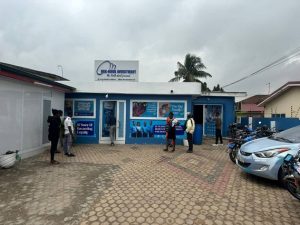Dr. Ernest Addison – Governor of Bank of Ghana
In a joint effort with the Ghana Police Service, the Bank of Ghana (BoG) has taken decisive action to shut down Dek-Nock Investments, located at Nungua and Ashaiman in the Greater Accra Region, for conducting operations without a proper licence.
The closure of Dek-Nock Investments is in line with Section 20(2)(g) of the Banks and Specialised Deposit-taking Institutions Act, 2016 (Act 930), which prohibits unauthorized financial activities.
According to a statement released by the Central Bank, the company was found to be involved in unauthorised deposit-taking practices in violation of Section 6(1) of Act 930.
The Bank of Ghana emphasized that all customers of Dek-Nock Investments should remain calm as investigations into the matter are underway.
The Ghana Police Service has been tasked with conducting further inquiries into the operations of Dek-Nock Investments, with the aim of unraveling the extent of the unlicensed activities being carried out by the company.
The overarching goal of the regulatory intervention is to safeguard the interests of depositors and uphold the integrity of the financial system.

The Central Bank reiterated its commitment to collaborating with law enforcement agencies to crack down on illegal deposit-taking schemes and ensure that perpetrators face appropriate legal consequences.
As the situation unfolds, the Bank of Ghana has assured the general public and relevant stakeholders that updates regarding the ongoing investigations and any subsequent actions will be promptly communicated.
Customers who have accounts or investments with Dek-Nock Investments are advised to cooperate with authorities and await further instructions as the regulatory bodies work towards resolution.
Amidst the closure of Dek-Nock Investments and the investigative processes that follow, maintaining transparency, accountability, and adherence to regulatory standards remain key priorities for financial oversight in the country.
By Vincent Kubi


